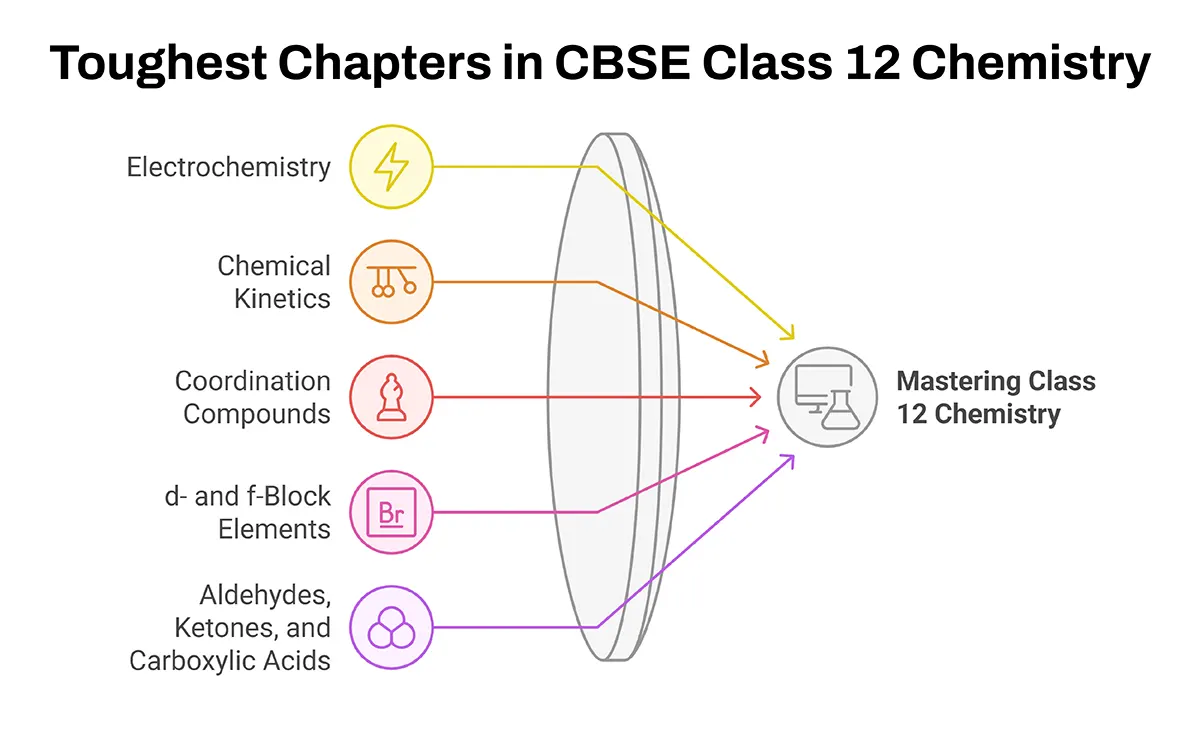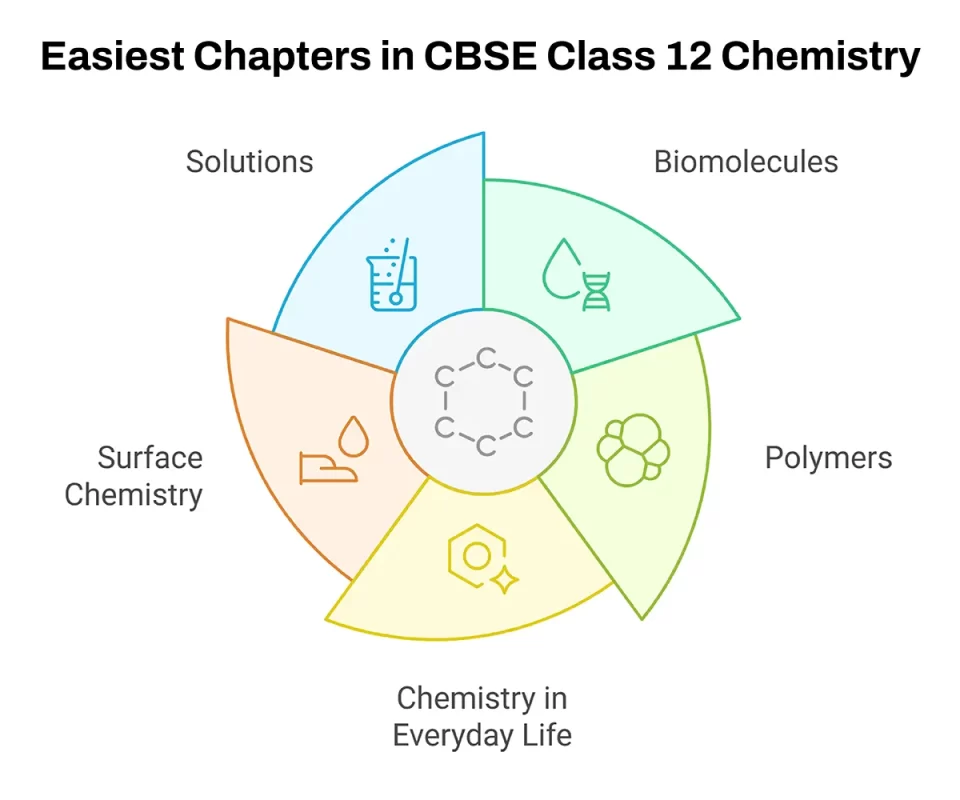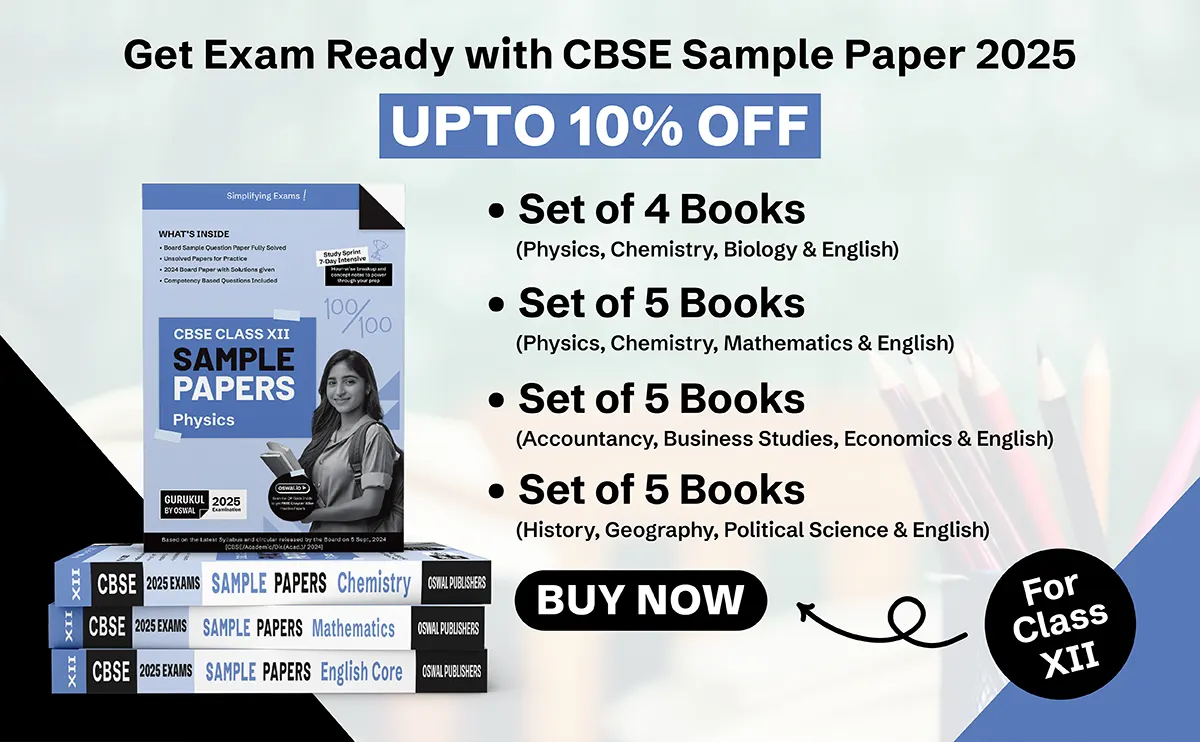CBSE class 12 chemistry is one of the most crucial subjects for students preparing for their board exams and competitive entrance exams like NEET and JEE. This subject plays a vital role in determining a student’s overall performance in the board exams, as it carries significant weightage and covers a vast syllabus.
However, not all chapters in class 12 chemistry are equally challenging. Some concepts require in-depth understanding, rigorous practice, and strong analytical skills, while others are relatively straightforward and easier to grasp. Students often struggle with certain chapters due to their complexity, abstract concepts, or the need for detailed memorisation. Understanding which topics require more effort can help students allocate their study time effectively.
In this blog, we will explore the toughest and easiest chapter in chemistry class 12, helping students focus their efforts in the right direction and improve their performance in the board exams.
CBSE Class 12 Chemistry Chapters
Because of various sections, students often have the question, “How many chapters in chemistry class 12?” CBSE class 12 chemistry is divided into three parts: Physical, Organic, and Inorganic Chemistry. Below is the complete list of chemistry class 12 chapters:
Part 1: Physical Chemistry
- Solid State
- Solutions
- Electrochemistry
- Chemical Kinetics
- Surface Chemistry
Part 2: Inorganic Chemistry
- General Principles and Processes of Isolation of Elements
- The p-Block Elements
- The d- and f-Block Elements
- Coordination Compounds
Part 3: Organic Chemistry
- Haloalkanes and Haloarenes
- Alcohols, Phenols and Ethers
- Aldehydes, Ketones and Carboxylic Acids
- Organic Compounds containing Nitrogen
- Biomolecules
- Polymers
- Chemistry in Everyday Life
Now, let us look at the most challenging and easiest chapters from this syllabus.
Toughest Chapters in CBSE Class 12 Chemistry
Some chapters in class 12 chemistry require deep conceptual clarity and thorough practice due to their complexity. Here are some of the toughest chapter in chemistry class 12:

1. Electrochemistry
This chapter covers electrochemical cells, the Nernst equation, and conductance. It requires numerical problem-solving and an understanding of redox reactions. The most challenging part is applying formulas correctly in calculations.
2. Chemical Kinetics
It deals with reaction rates, rate laws, and activation energy. Students must solve numerical problems using equations like the Arrhenius equation. Understanding reaction mechanisms and mathematical calculations makes it difficult.
3. Coordination Compounds
This chapter explains metal-ligand bonding, isomerism, and Werner’s theory. It requires strong memorisation skills, especially for ligand types and structures. The hardest part is understanding isomerism and complex ion formation making it one of the toughest chapter in chemistry class 12.
4. d- and f-Block Elements
It covers the properties, oxidation states, and reactions of transition and inner transition metals. The vast amount of factual information and trends makes it challenging. Remembering exceptions and multiple oxidation states makes it the toughest chapter in chemistry class 12.
5. Aldehydes, Ketones, and Carboxylic Acids
This chapter is one of the toughest chapter in chemistry class 12 since it focuses on the structure, properties, and reactions of these compounds. Memorising reaction mechanisms and differentiating similar reactions is difficult. Understanding nucleophilic addition and oxidation-reduction reactions makes it.
Also Read: Toughest and Easiest Chapters in CBSE Class 12 Biology
Easiest Chapters in CBSE Class 12 Chemistry
Some chapters are relatively simple, requiring less effort to grasp the concepts. These are some of the easiest chapter in chemistry class 12:

1. Biomolecules
This chapter covers carbohydrates, proteins, nucleic acids, and enzymes. It is mostly theory-based with minimal numerical problems hence one of the easiest chapter in chemistry class 12. The concepts are easy to understand as they relate to biological functions rather than requiring heavy memorisation.
2. Polymers
It explains different types of polymers, their properties, and their uses. The topics are simple, and there are no complex reactions or numerical problems. Since exam questions are direct, it is easy to score and among the easiest chapter in chemistry class 12.
3. Chemistry in Everyday Life
This chapter discusses the role of chemistry in medicines, food preservatives, and household products. The concepts are easy as they relate to daily life. Real-life examples make it interesting and require little memorisation.
4. Surface Chemistry
It covers adsorption, catalysis, and colloids, which are easier compared to other Physical Chemistry topics. The concepts are visual and straightforward. Since there are fewer formulas and calculations, students find it one of the easiest chapter in chemistry class 12.
5. Solutions
This chapter explains ideal and non-ideal solutions, Raoult’s Law, and colligative properties. If studied step-by-step, the concepts are logical and easy to follow. The formulas are simple, making numerical problems manageable.
Also Read: Toughest and Easiest Chapters in CBSE Class 12 Physics
Tips to Score Good Marks in CBSE Class 12 Chemistry Exam
To perform well in chemistry, students need a strategic approach. Here are some useful tips:
1. Focus on NCERT Books
- NCERT chemistry is the most important resource for board exams.
- Most questions are directly based on NCERT concepts.
- Make notes of important points while reading to aid in revision.
2. Solve Sample Papers & Previous Year Papers
- Helps in understanding exam patterns and types of questions.
- Oswal Publishers’ CBSE Sample Papers for class 12 chemistry is an excellent resource for practice.
- Time yourself while solving sample papers to improve speed and accuracy.
3. Master the Tough Chapters with Notes & Mind Maps
- Prepare short notes for difficult topics like Electrochemistry and Coordination Compounds.
- Use mind maps and flowcharts for organic chemistry reactions.
- Highlight key reactions and mechanisms to make revision easier.
4. Practice Numerical Problems
- Chapters like Chemical Kinetics and Electrochemistry involve numerical questions.
- Solve different types of numerical problems from Oswal Books to strengthen your practice.
- Regularly practice numerical to avoid calculation errors during exams.
5. Revise Regularly
- Chemistry requires multiple revisions for retention.
- Revise formulas, reactions, and important properties daily.
- Maintain a revision schedule to ensure all topics are covered before exams.
6. Understand the Marking Scheme
- Go through CBSE’s marking scheme to understand how answers should be framed.
- Learn how to present numerical solutions step-by-step for full marks.
7. Strengthen Your Weak Areas
- Take note of the toughest chapter in chemistry class 12 and focus more on them beforehand.
- Identify which topics need more focus and allocate study time accordingly.
8. Practise Organic Chemistry Conversions
- Solve reaction-based questions and practice conversions between compounds.
- Make a list of named reactions and their mechanisms.
9. Solve Assertion & Reason Questions
- These questions require conceptual clarity, especially in Physical and Inorganic Chemistry.
- Practice from previous years’ papers to understand the logic behind answers.
10. Use Reliable Study Resources
- Apart from NCERT, refer to Oswal Publishers’ class 12 chemistry question banks and other trusted study materials for additional practice.
For more in-depth preparation, check out reliable study resources like Oswal Publishers’ class 12 chemistry question banks and sample papers.
Conclusion
Chemistry in class 12 is a subject that requires a balance between conceptual clarity and memorisation. While some chapters like Electrochemistry and Coordination Compounds are challenging, others like Biomolecules and Polymers are easier. The key to excelling in chemistry is consistent practice, understanding complex topics, and solving as many sample papers as possible. Focus more on the toughest chapter in chemistry class 12 to lay a solid foundation.
With the right study strategy and resources like Oswal Publishers’ CBSE sample papers and question banks, students can master chemistry and score high in their board exams.
Useful Resources:
| CBSE Notes Class 12 Chemistry | NCERT Solutions Class 12 Chemistry |
| NCERT Books Class 12 Chemistry | CBSE Class 12 Chemistry Syllabus |
FAQs
Q1. What are the tough chapters in chemistry class 12?
Ans – Electrochemistry and Coordination Compounds are considered the toughest chapter in chemistry class 12 due to their conceptual complexity and numerical problem-solving requirements.
Q2. How can I easily remember Organic Chemistry reactions?
Ans – Use flashcards, mnemonics, and reaction flowcharts. Regular practice and solving conversion problems help in retention.
Q3. Are NCERT books enough for class 12 chemistry?
Ans – Yes, NCERT books are sufficient for board exams. However, additional practice from Oswal Publishers’ chemistry question bank can be beneficial.
Q4. What are the easy chapters in chemistry class 12?
Ans – Biomolecules, Polymers, and Chemistry in Everyday Life are one of the easiest chapter in chemistry class 12 as they are theory-based and require less memorisation.
Q5. How can I improve my marks in CBSE Chemistry?
Ans – Focus on NCERT, solve sample papers, revise regularly, and practice numerical problems. Using books like Oswal Publishers’ sample papers can help in structured preparation.


